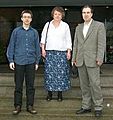Hilbert's tenth problem facts for kids
Hilbert's tenth problem is a famous challenge in mathematics. It was named after a brilliant mathematician called David Hilbert. He included it in a special list of very important math problems known as Hilbert's problems.
This problem asks if we can find a special set of step-by-step instructions, called an algorithm, that could solve any Diophantine equation. A Diophantine equation is a type of math puzzle where you are only looking for whole number answers.
It has now been proven that such an algorithm does not exist. This means there is no single set of steps that can solve every Diophantine equation.
Contents
What Is Hilbert's Tenth Problem About?
When David Hilbert shared his list of problems in 1900, this one was unsolved and seemed very hard. It was a big mystery for many years.
The first major step toward solving it happened in 1950. A mathematician named Julia Robinson came up with an idea, or a "hypothesis." This idea, known as the JR hypothesis, became very important for all the work that followed.
The problem was finally solved in 1970. Another mathematician, Yuri Matiyasevich, proved that Julia Robinson's hypothesis was correct. Earlier research had shown that if her idea was true, then the answer to Hilbert's tenth problem would be "no."
What Does a "No" Answer Mean?
The "no" answer means that we cannot create a universal algorithm. There is no single computer program or set of instructions that can take any Diophantine equation and always tell us if it has whole number solutions or not.
This doesn't mean we can't solve some Diophantine equations. It just means there isn't one magical method that works for all of them.
Images for kids
See also
 In Spanish: Décimo problema de Hilbert para niños
In Spanish: Décimo problema de Hilbert para niños
 | Selma Burke |
 | Pauline Powell Burns |
 | Frederick J. Brown |
 | Robert Blackburn |


